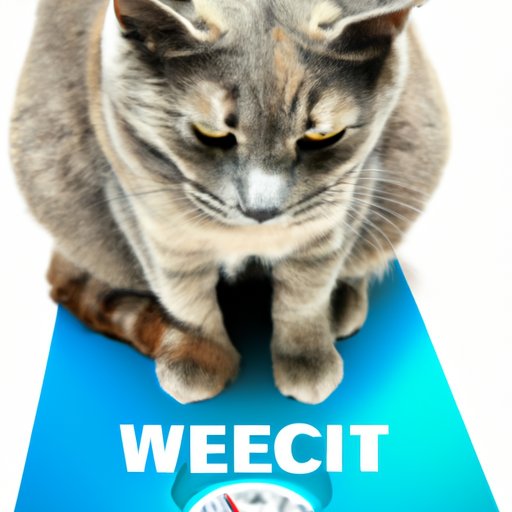
Introduction
As cat owners, we want our feline friends to be happy, healthy, and thriving. One important aspect of their health that often gets overlooked is their weight. Maintaining a healthy weight is crucial for cats, as it can prevent many health issues and ensure their longevity. In this article, we’ll explore what constitutes a healthy weight for a cat, the risks associated with feline obesity, and strategies for helping your kitty shed unhealthy pounds.
Purrfect Weight: An Expert Guide to Determining Your Cat’s Healthy Weight
Determining a cat’s healthy weight can be done through various methods, including visual inspection and body condition scoring. A healthy weight for a cat varies depending on its breed, size, and body type. In general, cats should have an hourglass shape when viewed from above, with a visible waist and a slight belly when viewed from the side. If you’re unsure whether your cat is at a healthy weight, consult with your veterinarian for guidance. They can also help you set weight goals for your cat and offer tips for interpreting the results.
Unpacking Feline Obesity: Why Maintaining a Healthy Weight Matters
Feline obesity is an increasingly common problem, with about 60% of cats in the US being overweight or obese. This condition can lead to various health risks, including diabetes, heart disease, and joint problems. Obesity in cats is caused by a variety of factors such as overfeeding, lack of exercise, or genetics. Therefore, monitoring a cat’s weight and taking steps to maintain a healthy weight can prevent these issues.
Feeding Your Feline: The Importance of Portion Control and Maintaining a Healthy Weight
Portion control is key to maintaining a healthy weight in cats. Measuring the amount of food you serve can help keep your cat from overeating. It’s also important to select a diet appropriate for your cat’s needs. Some cats may require specific diets due to their age, breed, or medical conditions. Additionally, treats should be given in moderation. You can incorporate occasional treats into your cat’s diet as a reward or to supplement their diet with extra nutrients.
Crunching the Numbers: A Step-by-Step Guide to Calculating Your Cat’s Ideal Weight
Calculating your cat’s ideal body weight can be done with the help of a veterinarian. However, if you want a rough estimate, you can use a formula to calculate it yourself. The ideal weight for a cat depends on its breed and body type. Generally, a healthy weight for a domestic shorthair cat ranges between 8 and 10 pounds. By knowing your cat’s ideal weight and body condition score, you can develop a weight management plan for your feline.
The Link between Diet and Weight in Cats: Tips for Keeping Your Feline Fit and Healthy
The food you feed your cat can play a significant role in their weight management. There are various types of cat food available, including wet and dry food, homemade, and raw food options. Wet food tends to have fewer calories than dry food, which can make it a good option for overweight cats. Additionally, some foods are specially designed for weight management and can provide your cat with the nutrients they need while keeping them from overeating. However, before introducing new foods, it’s best to consult with your veterinarian.
A Comprehensive Guide to Managing Your Cat’s Weight: From Exercise to Proper Nutrition
A comprehensive weight management plan for your cat should include a proper diet, portion control, and exercise. Exercise and playtime can help keep your cat healthy and entertained. It’s recommended that cats get at least 20-30 minutes of exercise per day, which can include playing with toys, climbing, or chasing lasers. Finally, if your cat is struggling to lose weight or has health issues related to their weight, it may be necessary to seek veterinary care.
Conclusion
Maintaining a healthy weight is vital to ensuring that your cat lives a long and healthy life. By understanding what constitutes a healthy weight for your feline, you can take steps to keep them at an ideal weight. By measuring their food portions, selecting an appropriate diet, and providing them with regular exercise and playtime, you can help your cat maintain a healthy weight and prevent various health issues.





